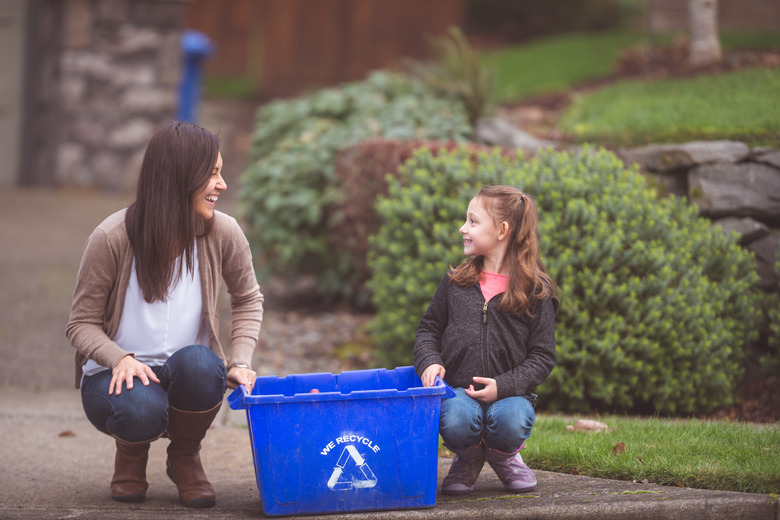25 Lazy Ways To Save The Planet Gallery
The statistics are pretty dismal, so we won't bore you with specifics — but we all know the environment is seriously struggling, especially when it comes to garbage and pollution. The bleak reality of environmental destruction can, at times, seem overwhelming. How many tons of garbage? How much noxious gas from carbon emissions?
It can be easy, when faced with such daunting facts, to throw in the towel and give up entirely. If all of humanity is responsible, your neglect couldn't possibly do that much more harm... But, collectively, it really can. And when you total your individual impact throughout the span of your lifetime, the effect can be massive.
Hiding behind excuses is also tempting. Recycling is hard. How are you supposed to get to work if you can't drive? And as for repurposing plastics, you are terrible at crafting.
But some environmentally-friendly changes are so simple, there is no excuse. For the average lazy person, here are 25 totally accessible ways to save the planet that will hardly require you lift a finger.
Bring a Mug to the Office
If you use a new plastic cup every time you grab a cup of coffee — or worse, a Styrofoam cup — you're going to generate a lot of waste. But there's no reason to cut back on the caffeine. Just bring a mug! You'll save the planet and your office recycling bin from overflow.
Buy Food in Bulk
Food packaging adds up quickly — especially if you're buying snack packs and individually wrapped bars. Every time you unwrap one, you're generating more trash and more unnecessary waste. An easy way to cut back is to buy snack foods in bulk. Consider buying large packages of nuts, dried fruits, and snack mix. You can always divvy them out later — preferably in an environmentally-friendly package.
Buy Local Produce
Some grocery store produce is shipped from thousands of miles away. All that transportation can cost you — both in terms of your wallet and your carbon footprint. Cut back on gas emissions and your grocery bill by buying local. Farmers market prices are often lower than typical grocery fare. The produce might expire more quickly, but it'll be worth it.
Cool It With the Thermostat
When it's cold outside, you really don't need to be cranking the heat full blast. Same goes for your air conditioning — it'll save you money (and carbon dioxide emissions) to be a little more modest with your thermostat. The Department of Energy recommends setting your thermostat to 68 degrees Fahrenheit in the winter and 78 degrees Fahrenheit in the summer. When you sleep, you can crank it even lower.
Cut Back on Food Waste
According to surveys from 2014, Americans throw away more than 50 million tons of food every year. And that's not all — for more upsetting statistics on just how much we manage to throw away, read these other mind-blowing facts about food waste. Luckily, there are easy ways to cut back. Firstly, get smart about repurposing leftovers. Learn the right ways to store your produce so they last longer. And keep up-to-date on the latest trends and companies working to reduce food waste nationwide.
Do Less Laundry
Who said being environmentally conscious was a chore? Doing fewer chores can actually help preserve the environment. If your clothes smell, by all means please wash them. But if you can wear a pair of pants or a sweater a second time without washing it, you should. Most standard washing machines use up to 40 gallons of water per load.
Donate Old Cell Phones
A broken cell phone is a huge bummer — but it's even more of a bummer for whatever landfill it may end up in. The tiny machines are filled with chemicals that don't exactly mesh nicely with nature and soil. Lead, mercury, and non-biodegradable plastic are all involved in their production. However, there are ways to recycle these items. Simply find an agency nearby with a collection location and donate your old phone. Many of the parts can be reused!
Don’t Bag Your Produce
Every time you wrap your produce in plastic, you're creating waste that could have been prevented. We know it seems like you're keeping your produce clean and preventing it from whatever bacteria is lingering on your grocery cart, but let's be real. Your produce has already been exposed to all kinds of germs before you place it in the bag. Other people's hands, whatever mode of transport is used by the grocery store, and your own hands are all potential sources of contamination. That's why washing your fruits and vegetables before eating them is so important! Don't bother with the bag.
Go Meatless on Mondays
"Meatless Mondays" are more than just a passing fad. According to the Environmental Working Group, if a four-person family skips the meat and cheese for one meal a week, it's the environmental equivalent of taking a car off the road for five weeks. Meat and dairy products produce a shocking amount of carbon emissions — even if you can't quit meat for good, skipping it now and then could make a huge impact. Luckily, plant-based meals don't have to suck. You might even find your new favorite recipe when you choose to cut back.
Go to the Library
It might feel nice to get newspapers and magazines delivered, but it's costing the planet a lot of paper. Plus, how many of those papers go unread? Your local library is stocked with all the newspapers and magazines you can read — plus, they happen to have a few books there, too. For exactly zero dollars, you can read as many as you'd like.
Order Sustainably Caught Fish
Wild-caught salmon is wildly different from the regular stuff — not only does it often taste better, but it's better for the environment, too. Sustainable fishing methods can make a huge impact. Consult the Monterey Bay Aquarium's regional Seafood Watch guide to determine which types of fish are caught most sustainably.
Pay Your Bills Online
This simple switch will save time and trees. Most banks make it easy to sign up for online banking; you'll likely find it's far more convenient, too. If possible, reduce the number of receipts you request, as well. Every ATM receipt is paper that didn't need to be wasted.
Recycle More Than Just Glass, Paper, and Plastic
Did you know you can recycle toothbrushes? What about old CD's, batteries, and bicycles? Even if most of these items don't belong in the bin, they're still recyclable. There are all kinds of recyclable household items you're probably throwing away.
Switch to a Drying Rack
A drying rack might be bulky and annoying, but if you have the space you should definitely make the switch. You'll never have to waste energy drying your clothes and you'll actually help your clothes to last longer. The harsh heat of the dryer can wear away cloth.
Switch to Green Energy
Many states offer the option to switch to renewable energy from your local power company — you only have to know about the option to ask. It's usually free to make the switch, and amounts to only a few extra dollars on your monthly bill. Once you opt for green energy, your electrical will come from sustainable sources such as wind, water, or solar energy. Simply check the website for the Office of Energy Efficiency & Renewable Energy to see if your area offers the service.
Turn the Lights Off When You Leave the Room
It's as simple as a flip of a switch. Break the habit of leaving unnecessary lights on by leaving little reminders on Post-It notes by your light switches. Eventually, it will become old hat — and the money you save on energy costs can add up!
Use Energy-Efficient Lightbulbs
Energy Star-qualified lightbulbs can save a ton of energy over time. Even though they cost more than your typical lightbulb, they'll also save you money. Energy-efficient bulbs last much longer than the rest, so you'll have to buy lightbulbs less often.
Use Plastic Containers for Your Food
When you're packing your lunch, take a second to think about the planet. While plastic food containers are easily washable and reusable, plastic bags and aluminum foil are not. Reduce the amount of waste generated simply by packing a little differently. Saving and reusing plastic containers from takeout is also a great way to cut back on waste; you'll also save money on buying your own! Just don't microwave them. You could be releasing unwanted chemicals into your food.
Use Power Strips
Power strips are useful for a number of reasons — mainly, plugging in more than just two electronics in the same area of your home. However, using one of these nifty devices can save a ton of energy. Even when you turn off some electronics, they continue sucking power from the socket. It's called "phantom power," and you waste it every time an electronic doesn't truly turn off. Some types of power strip can completely shut down when things are still plugged in, but powered off. You can also shut them off manually.
Use Reusable Grocery Bags
These cloth bags can carry lots of bacteria, but they're still worth using. Wash the bags as you would your clothes to protect your produce and rest easy knowing you're protecting the planet, as well. Even the paper bags at grocery stores are bad for the environment — maybe even worse than the plastic.
Use a Laptop
If you're choosing between a laptop and a desktop for your new computer, here's a fact that might sway your decision: Laptops use about half the energy of your typical desktop. Opting for a laptop could save you money off your electric bill — not to mention it would conserve a lot of energy.
Use a Reusable Water Bottle
Not only are plastic water bottles kind of gross, but they're also extremely wasteful — especially if, like many Americans, you don't recycle them. Buy a reusable water bottle that fits in your bag and carry it with you. You'll be able to stay better hydrated and save the Earth from swallowing hundreds of your used plastic bottles. Choose your water bottle strategically — depending on what kind you buy, it could end up hoarding tons of bacteria!
Use the Dishwasher
We're giving you a new excuse not to do the dishes. Washing dishes by hand actually uses more water than running full loads in the dishwasher.
Wash Your Clothes in Cold Water
According to Energy Star, 90 percent of the energy used when washing your clothes comes from heating water. Many people assume that cold water doesn't work as well to get your clothes clean, but that's not completely true. While hot water can be more effective generally, cold-water detergents are designed to work just as well as normal detergent in hot water.
Wear Organic Cotton
Cotton might be the comfiest shirt material in your closet, but it's one of the least sustainable. Cotton is the second-most chemically sprayed crop in America, beat only by corn. Buying organic cotton helps save the environment from all kinds of chemicals. To protect your shopping cart from pollutants as well, read our guide to the "Clean 15," the fruits and vegetables with the least chemical residue.
More from The Daily Meal:
9 Drinks That Are Making You Break Out
19 Chemicals You Didn't Know Were in Your Food
Ways to Save Money at Trader Joe's

























